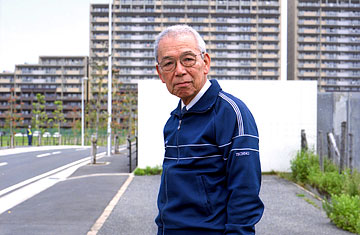
Jin Matsushita, now 73, has seen far better days
(2 of 2)
The Toll of a Long Slumber
Bubbles are fun, but when Japan's imploded, it sucked the life out of an entire country, stripped it of ambition and of the sense of rapid progress that had come to define its postwar history. Yoichi Funabashi, now the editor of the Asahi Shimbun, one of Japan's most influential daily newspapers, told me: "An entire generation has been born and grown up, and known nothing but slow economic growth and limited opportunity. Compare them to their father's generation, the generation that turned so many Japanese companies into household names all over the world. I don't think young people today have any idea what they are going to do, or what even they are supposed to be doing."
On a visit to Tokyo today, it's easy to miss this toll that the country's long slumber has taken. The city has always been orderly and efficient, and parts of it now seem even more prosperous than they did in 1989. The once drab business district around Tokyo Station near the Imperial Palace is now full of high-end retail shops and pleasant pedestrian malls. Japan in some ways managed to spread the economic pain over 20 years, so that it is more like an endless dull ache than an open wound.
For many Japanese, though, the pain is not merely abstract and psychological. Consider Matsushita. Nine years after the Nikkei peaked, Yamaichi Securities — the company where Matsushita, in true Japanese fashion, spent his entire career — went under. It had finally succumbed to the moribund stock market, as well as a scandal in which company officials got caught hiding trading losses. Matsushita had 90% of his life savings tied up in Yamaichi stock when it imploded. Although he was a financial adviser and ought to have understood the risk, this is not so surprising. Ask an American what he does for a living, and he'll usually describe his profession: I'm a banker, an engineer, an auto worker. Ask a Japanese, and he'll name his employer — I work for Toyota, I work for Sony — because he fiercely identifies with that organization. When I gently suggest to Matsushita that perhaps it was unwise for him to have put all his savings in one basket, he gets a bit defensive. "My wife and I had furious squabbles over this after Yamaichi went down," he says quietly. "She asked how I could do this. But I worked for Yamaichi Securities,'' he explains. "It never occurred to me, never, that one day our company would not exist." And then, to reinforce his point, he says to his American visitor: "One year ago, did you think it was possible for General Motors to go bankrupt?"
I don't have the heart to tell him yes. Americans today are learning only too well that industrial icons can fail when a bubble bursts. The crash of the debt-fueled U.S. real estate market and the subsequent financial crisis have plunged the country into the worst recession in decades. Although the U.S. is starting to show signs of stability, Japan's postbubble malaise demonstrates how long it can take for a damaged financial system to heal.
Twenty years on, Matsushita is still counting the costs of Japan's years of excess. Sitting in the community room of a residential complex east of Tokyo, where he now lives, he explains how he bought his apartment in 1996, the year he retired from Yamaichi. He paid 76 million yen (about $775,000 at current exchange rates) for the place, borrowing 59 million yen of the total to finance it. That debt is the bane of Matsushita's existence. When Yamaichi failed in 1998, wiping out most of his savings, he had no way to pay off the note with just his meager income from social security. The price of his apartment collapsed soon after he had bought it, so he can't sell. And unlike in the U.S., where owners can take their lumps and walk away from mortgages without the debt following them, Matsushita's is a "recourse" loan — common in Japan — which means that harsh penalties await those who fail to keep making payments for any reason.
So eight years ago, Matsushita took a job at a local 24-hour convenience store to make enough money to live and pay off his mortgage. The septuagenarian works the graveyard shift — 9:45 p.m. to 7:15 a.m. — for $81 a day. "I usually do get to work overtime hours and make a bit more money," he says, "because the high school and college kids [who relieve him in the morning] aren't very responsible. They are always coming up with excuses as to why they can't make it in until 10 a.m. or so.'' And just before heading off for another night shift, he adds: "That never happened when I was young." But when Matsushita was young, Japan had its best days ahead of it.